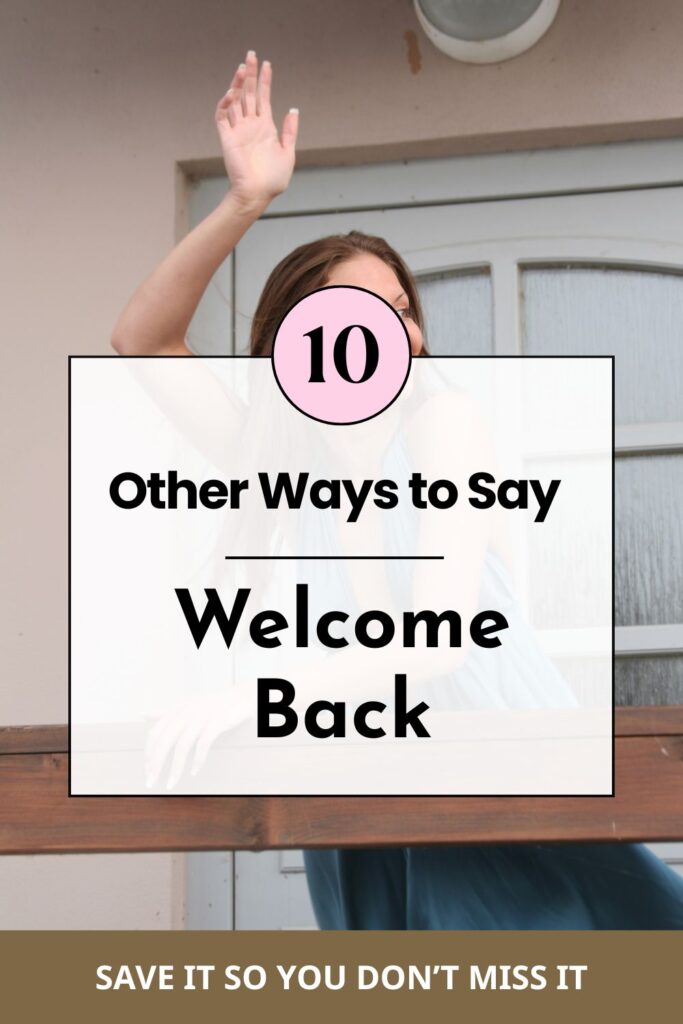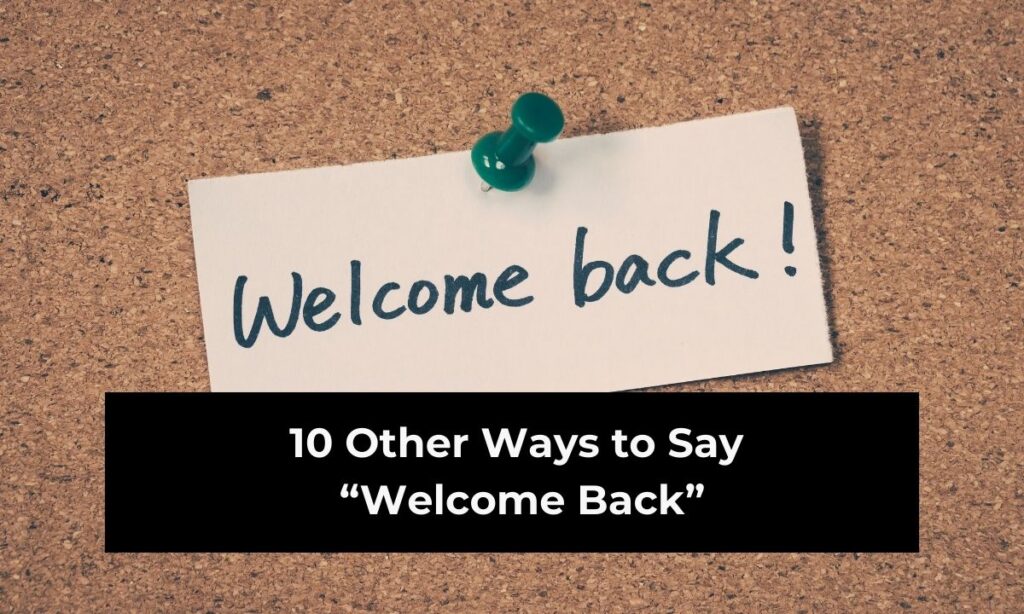There are moments in life when someone’s return—whether to work, school, home, or even a friendship—feels truly special. Saying “welcome back” is the go-to phrase we all use, but let’s be honest—it can start to sound repetitive and predictable. If you want your words to stand out and feel more heartfelt, finding fresh ways to greet someone can make all the difference.
When you take the time to use a more creative or thoughtful phrase, it shows that you genuinely care. Think about it: when someone returns after a long trip, a break from work, or even after recovering from an illness, your words are often the first thing they hear. Those words set the tone, carry emotion, and remind them of how much they were missed.

Using alternatives to “welcome back” helps you communicate warmth, appreciation, and excitement in a way that feels personal. Maybe you want to sound casual and fun, or perhaps professional and polished. Either way, having a collection of alternatives in your vocabulary helps you adapt to different situations—whether you’re writing an email, greeting a friend at the airport, or reconnecting with a colleague.

In this article, you’ll discover 10 other ways to say “welcome back” that are creative, friendly, and versatile. Each alternative comes with examples and explanations, so you’ll know exactly when and how to use them. By the end, you’ll never have to worry about repeating the same old phrase again—you’ll have a whole toolbox of meaningful greetings at your disposal.
1. “It’s Great to See You Again”
This phrase carries a warmth that feels genuine and personal. Instead of focusing on the fact that someone has returned, you highlight how happy you are just to see them again.
When you say “it’s great to see you again,” you’re letting the other person know their presence makes a difference. It’s especially effective in face-to-face interactions because it pairs naturally with a smile or eye contact, making the message even more heartfelt.
You might use this when greeting a friend after months apart, or when a coworker comes back from vacation. It works beautifully in both casual and professional settings because it strikes the perfect balance between polite and warm.
For example, imagine a colleague returning from maternity leave. Saying “It’s great to see you again!” makes them feel both appreciated and missed. Or when you reunite with an old friend at a coffee shop, this phrase communicates joy without being overly formal.
Short, sincere, and easy to use—this phrase is a timeless way to remind people that their return matters.
2. “We Missed You”
Few phrases capture emotion as directly as “we missed you.” It instantly reassures the other person that their absence was felt and that they hold a valued place in your life or group.
This expression works well in personal situations, like welcoming a family member home after a trip, or in group settings, such as a team welcoming a colleague back after time away. By using “we” instead of “I,” you emphasize a sense of belonging and connection.
Picture a student returning to class after being sick. Hearing “we missed you” not only welcomes them back but also reminds them they’re an important part of the group. Similarly, when a close friend rejoins your circle after moving back to town, those three words can create an instant emotional bond.
What makes this phrase powerful is its simplicity. It doesn’t try too hard, yet it conveys care and affection in a way that’s hard to ignore.
3. “Glad to Have You Back”
This phrase works like a charm in professional and formal settings, while still feeling personal. Saying “glad to have you back” communicates appreciation and relief in a way that fits business environments, team dynamics, or even formal gatherings.
It’s especially useful in workplaces when someone has been away due to leave, travel, or illness. For instance, a manager might say this to an employee returning to work: “We’re glad to have you back—the team hasn’t been the same without you.” It makes the individual feel valued and reminds them that their presence is essential.
Outside of work, you can also use this when greeting someone at an event or gathering. Maybe your friend is rejoining a weekly book club after missing several sessions. Telling them “Glad to have you back” creates a sense of inclusion and positivity.
It’s a phrase that communicates both respect and warmth, making it one of the most versatile alternatives to “welcome back.”
4. “Things Weren’t the Same Without You”
Sometimes, the best way to welcome someone back is to remind them of the impact they make. Saying “things weren’t the same without you” conveys how much they contribute to a space, group, or relationship.
This phrase goes beyond simple politeness—it emphasizes that the person’s absence left a noticeable gap. Imagine telling this to a close friend who just returned from a study-abroad trip. They’ll immediately feel how much they mean to you.
In professional environments, it works too. A teacher welcoming back a student or a manager greeting an employee can use this phrase to boost confidence and reassure the person of their value. It shows they are not just another member of the group, but someone whose presence makes a difference.
It’s thoughtful, memorable, and personal—the kind of phrase that sticks in people’s minds long after they hear it.
5. “Good to Have You With Us Again”
This phrase has a slightly formal yet welcoming tone. It’s excellent for professional or community settings where you want to show respect along with warmth.
Imagine welcoming back a team member at a company meeting: “It’s good to have you with us again. We’ve been looking forward to your ideas.” This kind of greeting makes the person feel respected and reassures them that they belong.
It also works beautifully in social gatherings or clubs. If a friend is returning to a sports league or a volunteer group after a break, this phrase communicates genuine appreciation for their presence.
What makes it strong is its adaptability—you can make it sound professional in an email or personal in a face-to-face conversation. Either way, it’s a polished alternative to “welcome back.”
6. “Home Sweet Home”
If you’re greeting someone returning to a familiar place—like a house, hometown, or family setting—“home sweet home” is a warm and cozy way to say “welcome back.”
This phrase carries emotional weight, evoking comfort, safety, and love. It’s perfect for when someone has been away on a trip, deployed for work, or simply moved back after years away. Imagine greeting your sibling returning from college by saying: “Home sweet home—we’ve been waiting for you!”
It works in informal, personal situations where the focus is on warmth rather than professionalism. You wouldn’t typically use this in a corporate office, but at home, it feels just right.
More than just a greeting, this phrase reminds people that no matter where they’ve been, they have a special place waiting for them.
7. “Back Where You Belong”
This phrase has an uplifting and affectionate tone, reminding the person that they’re in the right place. “Back where you belong” is often used in personal situations, like when family or friends return after time apart.
It emphasizes belonging and comfort, reinforcing the idea that their presence completes the space. For example, saying this to a partner who returns from a business trip communicates both affection and reassurance.
You can also use it in casual group settings. Maybe your teammate comes back to practice after an injury—you can say: “Back where you belong, and we’re all happy about it.”
The phrase is powerful because it doesn’t just acknowledge their return—it highlights their significance in the environment they’ve come back to.
8. “The Place Hasn’t Been the Same Without You”
This is a more descriptive alternative that emphasizes how much the person’s presence affects the atmosphere. While similar to “things weren’t the same without you,” this phrase feels more conversational and paints a vivid picture.
It works beautifully in both professional and casual settings. For example, you might say this to a colleague who’s back from leave, or to a friend who finally returns to your favorite weekend hangouts.
When you use this phrase, you’re acknowledging their importance in shaping the mood, culture, or dynamic of the place. It tells them that their absence left a noticeable void, and now that they’re back, things feel whole again.
It’s a thoughtful and meaningful way to go beyond a standard “welcome back.”
9. “So Happy to See You Back”
This phrase is simple, heartfelt, and filled with joy. It communicates genuine excitement and appreciation for someone’s return.
You might use this when welcoming a close friend after months apart, or when reuniting with a colleague after they’ve been away. It’s a phrase that comes straight from the heart and works in almost any situation.
For example, imagine a student returning to class after an extended break. Hearing “so happy to see you back” not only makes them feel welcomed but also encourages them to re-engage with ease.
Its beauty lies in its sincerity—you’re not just acknowledging their return, you’re celebrating it.
10. “We’re Complete Again Now That You’re Here”
This phrase carries a strong emotional weight and is perfect for situations where someone’s presence feels essential to the group or relationship.
It’s a beautiful way to welcome a family member back home, a teammate back to the field, or a close friend back into a circle. Saying “we’re complete again now that you’re here” communicates that they are not just part of the group—they are an irreplaceable piece of it.
This phrase works especially well in personal settings where emotions run deep. It might feel too heavy for workplace environments, but in friendships, families, or communities, it has the power to create lasting memories.
It’s one of those greetings that people don’t forget, because it not only welcomes them back but also reminds them of their value.
Conclusion
When someone returns after being away, your words can carry more weight than you realize. Saying “welcome back” is polite and familiar, but using creative alternatives makes your greeting memorable and heartfelt.
Whether you choose “it’s great to see you again” for a friendly tone, “glad to have you back” for a professional setting, or “home sweet home” for a family moment, each phrase adds depth and warmth. By picking the right alternative, you show the person that you didn’t just notice their absence—you truly value their return.
The next time you greet someone, try one of these alternatives. You’ll find that your words not only brighten their day but also strengthen your connection with them. After all, language is powerful, and the way you welcome someone back can leave a lasting impression.
FAQs
1. Why should I use alternatives to “welcome back”?
Using alternatives keeps your greetings fresh and personal. It helps you adapt to different situations—whether casual, professional, or emotional.
2. Can these phrases be used in professional settings?
Yes. Options like “glad to have you back” or “good to have you with us again” are polished enough for workplaces and emails.
3. Which phrases work best for family and friends?
Phrases like “home sweet home” or “back where you belong” feel warm and personal, making them perfect for close relationships.
4. How do I make these greetings feel more genuine?
Pair your words with body language—smiles, eye contact, or even a hug in personal settings. Sincerity makes the biggest impact.
5. Are these alternatives suitable for written messages?
Absolutely. Many of these phrases work in cards, texts, or emails. Just choose the tone that best fits your relationship with the person.





